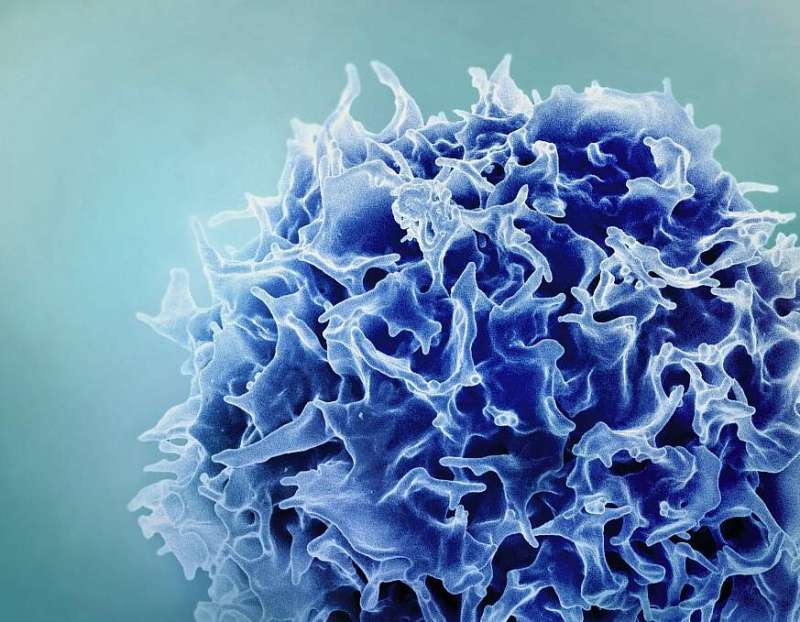This article has been reviewed according to Science X's editorial process and policies. Editors have highlighted the following attributes while ensuring the content's credibility:
fact-checked
peer-reviewed publication
trusted source
proofread
Potential treatment for rare autoimmune disorder could be adapted from CAR-T therapy, suggests clinical trial

Evidence from a small-scale clinical trial suggests that a variation of the advanced blood cancer immunotherapy known as CAR-T could be adapted to treat myasthenia gravis, an autoimmune disorder of the nervous system. The modified CAR-T therapy, short for chimeric antigen receptor T-cell, used by scientists offers the potential for a longer-lasting reduction in myasthenia gravis symptoms and was well-tolerated without significant adverse effects.
The study is published in The Lancet Neurology.
"Repurposing a groundbreaking therapy such as CAR-T to potentially treat a neurological disorder shows the versatility of immunotherapies in instances where there are limited to no treatment options," said Emily Caporello, Ph.D., director of the NINDS Small Business Program.
Myasthenia gravis is a chronic autoimmune disorder most often caused when the body's immune system attacks a protein found where nerve cells communicate with muscles. The disease is marked by muscle weakness that worsens after periods of activity and can improve somewhat after rest. Current treatments focus on controlling symptoms, primarily muscle weakness.
In the study, 14 people with generalized myasthenia gravis received varying doses of a modified form of CAR-T therapy, known as Descartes-08, targeting the cells responsible for producing myasthenia gravis-causing antibodies. The ideal dosage was determined to be once weekly for six weeks.
Early data on the effectiveness of the treatment are promising, but additional clinical studies are needed to evaluate the therapy's efficacy. Three patients receiving Descartes-08 showed complete or near-complete elimination of their symptoms, which continued six months following treatment. Two others no longer required chronic intravenous immunoglobulin treatment, which is currently used in some severe MG cases.
"What we saw were deep, durable responses to Decartes-08 that persisted for at least six months following treatment," said Murat V. Kalayoglu, M.D., Ph.D., president and CEO of Cartesian Therapeutics. "We have now begun a larger randomized, placebo-controlled study, which is the first of its kind for an engineered adoptive cell therapy."
CAR-T therapy involves taking a patient's T-cells—a key part of the immune system that can recognize and destroy invading pathogens—and reprogramming them to attack a specific target. In the case of blood cancers, the new target is the cancer itself. For myasthenia gravis, the target is the corrupted cells that make the damaging antibodies.
Many immunotherapies, including CAR-T, carry the risk of serious side effects that, while tolerable in the cases of advanced cancer, prohibit its use in more chronic conditions such as myasthenia gravis. Normally, T-cells are reprogrammed with DNA, which persists within the cells and is copied every time the cells divide. This can lead to an amplified effect and serious side effects.
To avoid this side effect, Descartes-08 uses messenger RNA (mRNA), which does not duplicate when cells divide, instead of DNA to reprogram T-cells. The result is a short course of treatment that is given multiple times instead of the single-dose regimen normally used in DNA programmed CAR-T therapy. The primary aim of this trial was to determine the ideal dosing for Descartes-08 that effectively reduces muscle weakness symptoms with minimal side effects.
Descartes-08 therapy is now being tested in a larger, clinical trial to determine its ability to reduce myasthenia gravis symptoms. Importantly, this trial will also include a placebo group, which is an important control to confirm that any observed improvement is due to the treatment rather than any unrelated effects.
More information: Volkan Granit et al, Safety and clinical activity of autologous RNA chimeric antigen receptor T-cell therapy in myasthenia gravis (MG-001): a prospective, multicentre, open-label, non-randomised phase 1b/2a study, The Lancet Neurology (2023). DOI: 10.1016/S1474-4422(23)00194-1




















